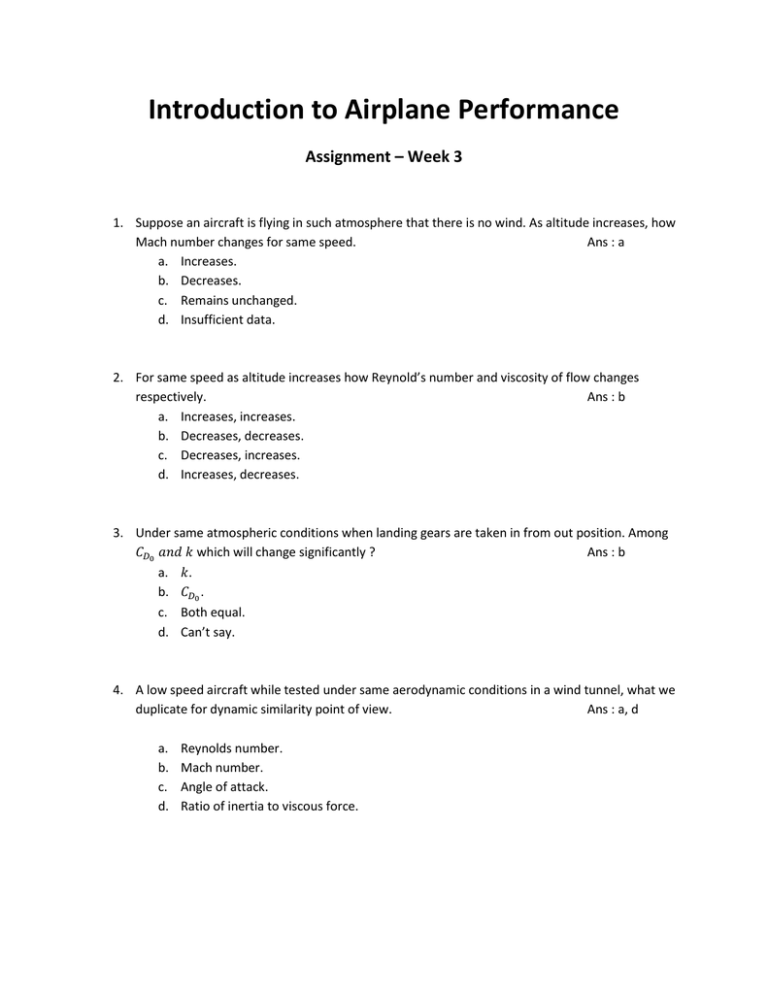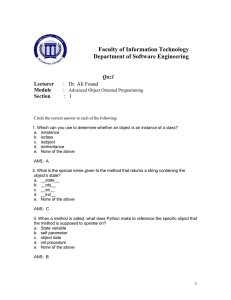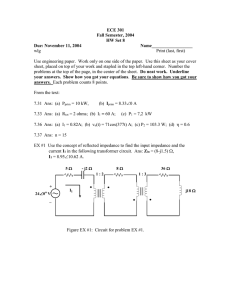Assignment III
advertisement

Introduction to Airplane Performance Assignment – Week 3 1. Suppose an aircraft is flying in such atmosphere that there is no wind. As altitude increases, how Mach number changes for same speed. Ans : a a. Increases. b. Decreases. c. Remains unchanged. d. Insufficient data. 2. For same speed as altitude increases how Reynold’s number and viscosity of flow changes respectively. Ans : b a. Increases, increases. b. Decreases, decreases. c. Decreases, increases. d. Increases, decreases. 3. Under same atmospheric conditions when landing gears are taken in from out position. Among 𝐶𝐷0 𝑎𝑛𝑑 𝑘 which will change significantly ? Ans : b a. 𝑘. b. 𝐶𝐷0 . c. Both equal. d. Can’t say. 4. A low speed aircraft while tested under same aerodynamic conditions in a wind tunnel, what we duplicate for dynamic similarity point of view. Ans : a, d a. b. c. d. Reynolds number. Mach number. Angle of attack. Ratio of inertia to viscous force. 5. In 2D aerofoil 𝐶𝑑 increases with angle of attack. This increment is due to increment in : ans : c a. Only induced drag. b. Only skin friction. c. Only flow separation. d. Induced drag and skin friction. 6. In following figure for a given altitude power available and power required Vs velocity plot is given. At which velocity the rate of climb will be maximum? Ans : c A a. b. c. d. 7. B C D A B C D Which of the following parameters can be read from the parabolic polar diagram of an airplane? Ans : d a. The aspect ratio of the wing and the induced drag coefficient. b. The minimum rate of descent and the induced drag. c. The induced drag and the parasite drag. d. The minimum glide angle and the parasite drag coefficient. Data for question 8 to 12 Drag polar of an aircraft is given by 𝐶𝐷 = .020 + .019 𝐶𝐿2 and 𝐶𝐿𝛼 = 4.5 per radian. 8. What is the value of parasite drag coefficient? a. 0.020 b. 0.019 c. 1.052 d. 1.025 9. 𝐶𝐿 𝐶𝐷 is maximum for 𝐶𝐿 = a. b. c. d. 10. 𝐶𝐿 3/2 𝐶𝐷 Ans : c 1.052 1.777 1.025 Insufficient data is maximum for 𝐶𝐿 = a. b. c. d. Ans : a Ans : b 1.052 1.777 3.157 Insufficient data 11. For thrust required minimum theoretically at what angle of attack the aircraft is flying? Is this angle of attack advisable? Ans : b a. b. c. d. 13 degree, yes 13 degree, no 22.6 degree, yes 22.6 degree, no 12. For power required minimum theoretically at what angle of attack the aircraft is flying? Is this angle of attack advisable? Ans : d a. b. c. d. 13 degree, yes 13 degree, no 22.6 degree, yes 22.6 degree, no

